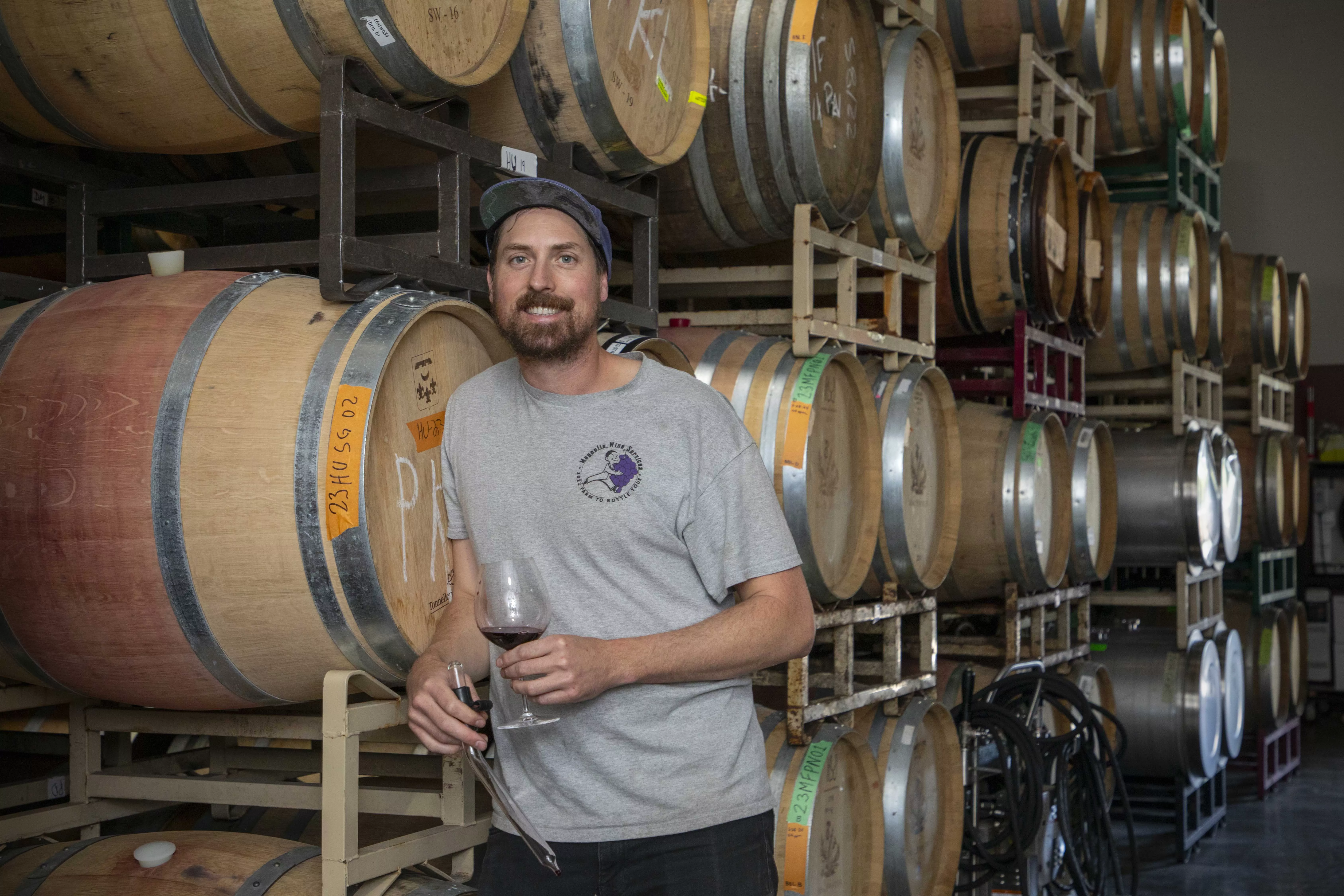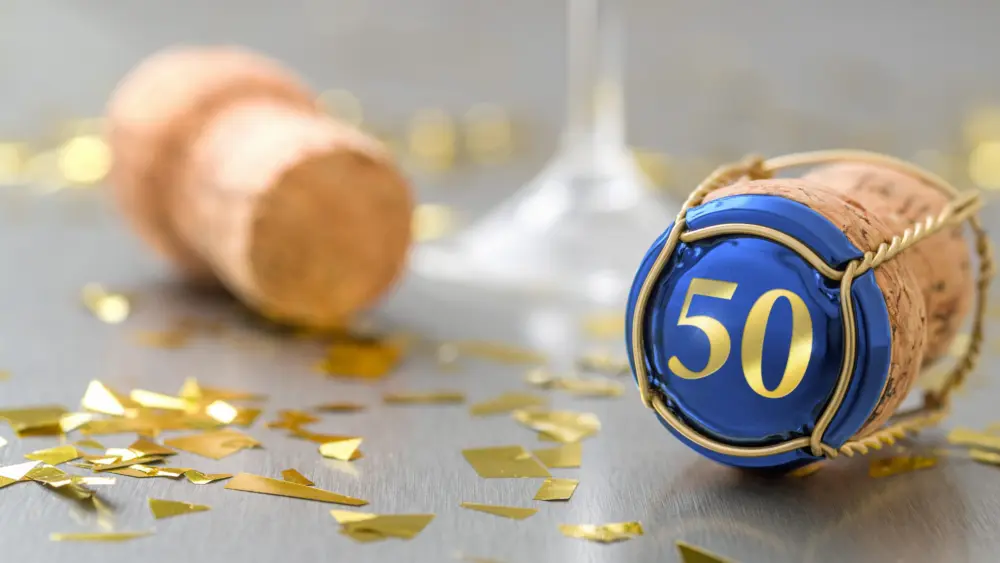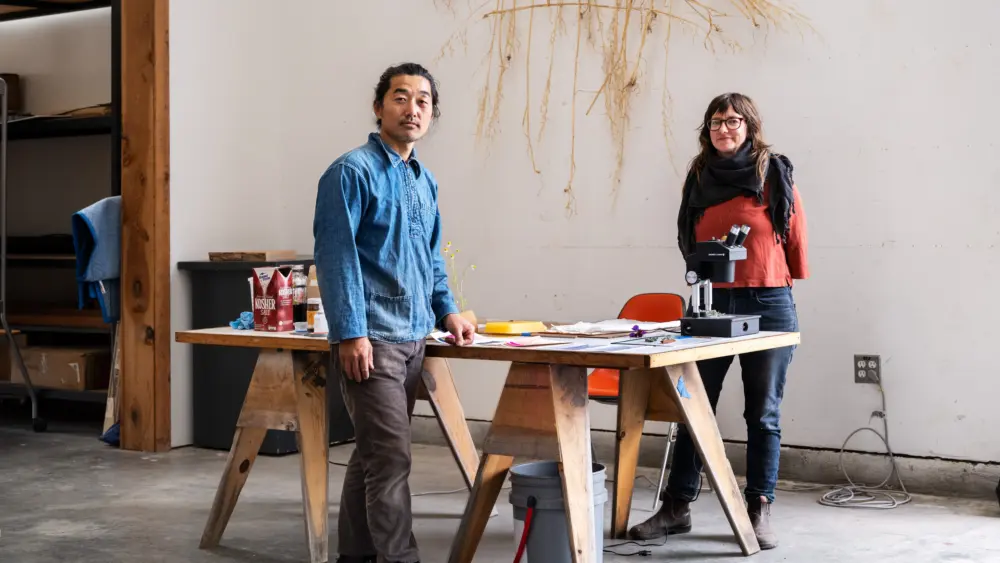What’s a ‘custom crush’?
A custom crush facility is a plug-and-play, shared winery space utilized by small wine labels. You pay a fee, often based on the quantity of fruit you’re vinifying, in exchange for use of winemaking equipment and a helpful staff on hand to facilitate the winemaking process. Services range from picking and crushing grapes, to storing wine, to bottling and labeling finished wine.
From hobbyists, to retirees, to passionate first-time winemakers, custom crush facilities offer anyone a chance to bottle their own, unique wines without the immense upfront costs. While it’s not exactly cheap to make wine at a custom crush, it’s certainly a lot more affordable than building a winery of your own. Some wineries open up their spaces to custom crush clients to help offset the costs of building and operating their facilities.
As Jack Sporer, owner and operator of Magnolia Wine Services, explains, “In Sonoma, there’s not an appetite to create more wineries.” Sporer feels the town is already home to the maximum number of wineries it can accommodate and goes on to explain, “If you don’t have a winery, you have to do custom crush.” With this logic in mind, when Sporer and his uncle, Will Bucklin, needed a place to make their wine, establishing a custom crush facility in Sonoma felt like a no-brainer.
Beyond needing winery space of his own, Sporer was becoming increasingly aware of a gap in the local market. While there were a number of custom crush facilities to choose from in the North Bay, few were focused on natural winemaking and the promotion of organic viticulture. Sporer and his natural winemaking peers in Sonoma needed a place to make wine and none of them could afford to break ground on a winery of their own.
Understanding natural wine
While conventional wine continues to dominate the narrative in the North Bay, the number of natural winemakers working here is on the rise. According to a 2023 story about natural wine in the Press Democrat, the movement is gaining steam thank largely to millennials, who make up a sizeable portion of both producers and consumers of the product.
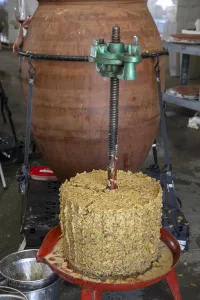
As with custom crush, natural wine tends to lurk in the shadows of the larger North Bay wine scene. This may be in part because most natural winemakers do not own vineyard land, winemaking facilities or tasting rooms. Thus, they are tasked with getting creative: they lease vineyard land or purchase organic fruit from organic vineyards around Northern California, they make their wine at custom crush facilities or other shared wineries and they rely on pop-up events and other imaginative sales channels to get their wines in front of customers.
Though a universal definition may never be reached, most agree that natural wine is made with organic or biodynamically farmed fruit, fermented spontaneously with native yeast, free of additives and bottled with very little to no sulfur added.
As one might explain it to the uninitiated, natural wine is to conventional wine what sourdough bread is to grocery store bread. The difference, largely, comes down to the yeast and organic base material. Fermentation is the process by which yeast converts carbohydrates into alcohol or acid. Before this process was understood on a biochemical level, all fermentation was “natural” and occurred spontaneously fueled by the native yeasts present in the environment: on the grapes, in the vineyard and in the winery.
In the 1850s, French chemist Louis Pasteur uncovered the mystery behind fermentation, realizing it was acted out by living yeast cells. This changed everything. By understanding what was happening when grape juice became wine, or flour and water became bread, winemakers and bakers could isolate these yeast strains and begin to control them. Winemaking and bread making (not to mention yogurt, cheese and coffee production) could become consistent, easier and more reliable processes. With guaranteed results, you could produce a lot more fermented products on much grander scales. And you could be sure your loaf of bread or bottle of wine would taste the same every time.
All bakers could opt to use commercial yeast, guaranteed to rise predictably and taste a certain way, but instead some choose to bake with sourdough starters because they are seeking a unique, tangy loaf. Natural winemakers are similarly in search of a less predictable end product when they eschew commercial yeast in favor of native fermentation. They are after a variable product that, in their opinion, best represents the unadulterated characteristics of the grape(s) they are working with. Compare this to the conventional winemaker who seeks a consistent bottling year after year, and is thus forced to make adjustments to compensate for inevitable variables each harvest season.
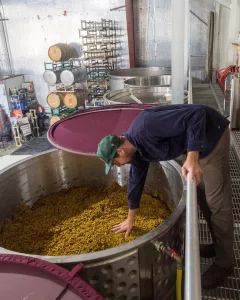
Meet Magnolia Wine Services
When it comes to natural winemaking in the town of Sonoma, Magnolia Wine Services has become an epicenter and crucial community resource in the short span since opening its doors.
Sonoma-native Jack Sporer worked harvests around the globe before returning home to launch Fresco, his natural wine label, in 2019. At the time, Sporer and his uncle, fellow winemaker Will Bucklin, were both crushing at Enkidu, the winery that would later become Magnolia, with Sporer working as production manager. Enkidu lent out 75% of its space for custom crush clients before ultimately deciding to put the winery up for sale.
Presented with the decision to move either both of their productions to a new winery or purchase the existing winery, Sporer and Bucklin decided to buy. “It was a combination of good timing and knowing the space,“ Sporer explains. “When [Enkidu] went up for sale, it seemed like a good fit. The cost of building a winery was prohibitive but moving into an existing one, with some existing custom crush customers, made it more financially feasible.”
Sporer and Bucklin bought-in to Magnolia Wine Co. in 2020, establishing a full-service custom crush specializing in natural wine and organic grapes. Unsurprisingly, 2020 proved a difficult year to establish the business. COVID combined with a smokey harvest season put a damper on Magnolia’s first-year numbers but they’ve experienced positive growth since. 2023 was the biggest year for the facility to date, with 24 clients processing a collective total of 250 tons of fruit. Sporer is optimistic that this growth trend will continue.
Pricing at Magnolia depends on lot size and the specific needs of each winemaker, but tends to range between $2,000 and $3,000 per ton of grapes. For context, one ton of grapes yields roughly 120 gallons of wine, which is two barrels, aka 50 cases, or 600 bottles. This fee gets wine from the crush pad to the bottling line. The facility was almost at capacity this past harvest, but they are always willing to make space for the right clients.
In addition to Magnolia, many independently owned wineries throughout the North Bay operate as custom crushes, offering space and services to natural winemakers on the side. Pax Mahle Wine in Sebastopol is a well-established, shared winery that serves as home to a rotating cast of winemakers including Martha Stoumen Wines, Emma Wines, Pax and others. Two Shepherds, a natural winery in Windsor, also offers its space to other winemakers including Unturned Stone and Glassmaker Wine. While they are not full-service custom crushes, these are important shared spaces that operate in a similar manner to Magnolia, serving as additional hubs of natural winemaking in Sonoma County.
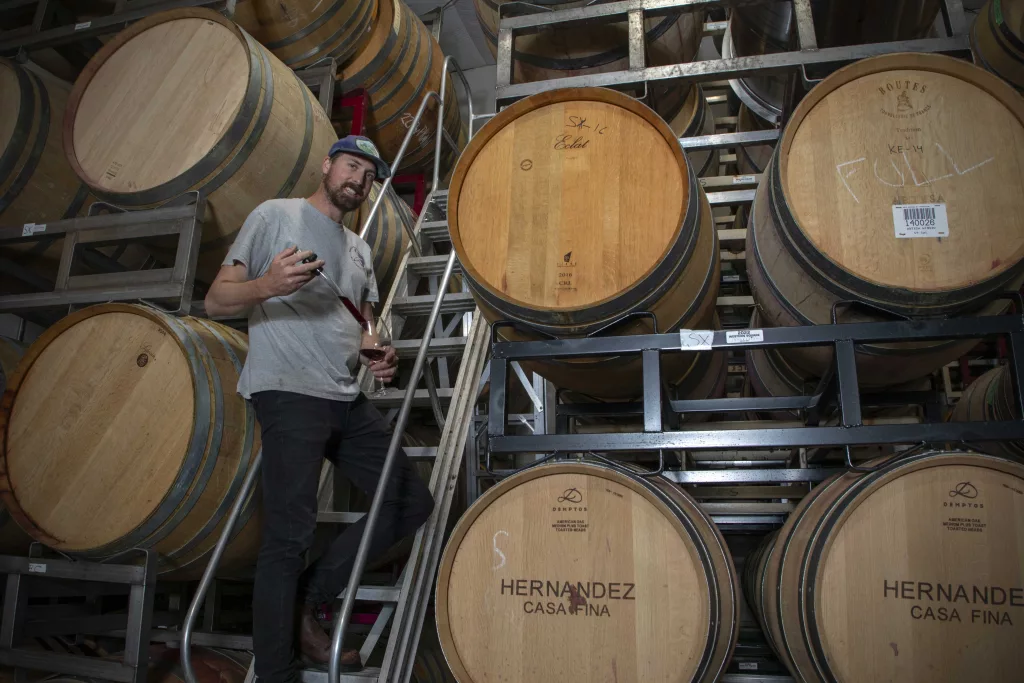
Organic viticulture and clean winemaking
While half of Magnolia’s clients make wine naturally, practically all clients bring in organically grown grapes. For Sporer, this is a major win. Sporer sees his responsibility first-and-foremost as promoting organic viticulture in Sonoma County and beyond. He’s even worked with local vineyard managers to consult on their transitions from conventional farming to organic. Creating a space where working with organic grapes is the norm is a true triumph for Sporer.
There’s a general misunderstanding that natural wineries should be rustic or, in other words, that cleanliness can be a hindrance to making natural wine. Sporer is keen to point out that due to the delicate nature of native yeast fermentations and the lack of preservation provided by added sulfur, you in fact need to work extremely cleanly to make good natural wine. In his words, “If you want to make natural wine, your winery needs to be extra clean and you need to be double-y attentive.” Magnolia prides itself on its cleanliness, making it a great place to make natural wine without flaws.
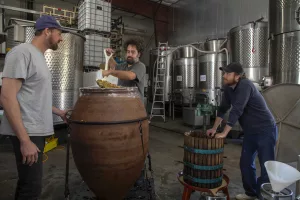
Exposure to oxygen in natural winemaking can also be problematic. When working with limited equipment, small-scale winemakers are sometimes not able to fill tanks to the point where they are devoid of oxygen. That’s where variable capacity tanks come in handy, and Magnolia is conveniently equipped with several. These tanks can be adjusted so they are always full, keeping oxygen out of wines and decreasing the potential for unwanted microbial growth.
Fostering community at Magnolia
While Magnolia is not a full-fledged natural winemaking facility, it’s beginning to trend in that direction. The roster of clients making wine naturally at Magnolia presents a who’s who of natural winemakers in the town of Sonoma: Maison des Plaisances, Marioni Wines, Fresco, Isa Wines, Jumbo Time Wines and Wavy Wines. It is this group of winemakers and their inherent urge to collaborate that makes working out of Magnolia so special.
Sporer fosters a collaborative and engaged community in part by hiring clients to work for Magnolia during the busy season. It’s all too common in the world of natural wine for harvest internships to go unpaid. In an effort to avoid unpaid labor and support winemakers who are just getting their start, Jack encourages his clients to apply for part and full-time roles during harvest. The clients who Jack hires on are then offered heavily discounted crush fees. Whether or not a client is hired on as staff, they are all encouraged to partake in as much of the winemaking process as they’d like. Jack requires all clients to have their own insurance and then gives them free reign to literally jump in: foot treading grapes, punching down ferments, racking wines, etc.
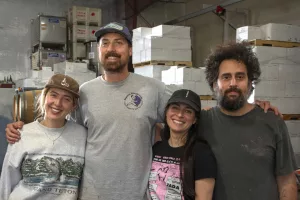
Perhaps above all, Magnolia is rewriting the narrative on utilizing a custom crush. ”It’s a real boon to be able to make wine here,” Sporer proudly says. In certain wine circles, it’s common to blow over, hide or obscure the fact that you make your wine at a custom crush. The reasons for this vary. For some brands, they are hoping to conjure an impression of grandeur, of prestige vineyards, historic cellars and ownership, and the custom crush shatters that illusion. For others, there’s a stigma that winemakers utilizing custom crushes aren’t “real winemakers.” Whatever the case may be, Magnolia is defying conventional wisdom when it comes to custom crush.
The community of natural winemakers that have coalesced at Magnolia and returned vintage after vintage to make their wines here are a tight knit group of passionate winemakers sharing resources, ideas, tips and support.
Throughout the harvest season, the winery is abuzz with winemakers and friends elbow deep in grapes, sharing wine wisdom and laughs over long lunches. As Sporer says, Magnolia during harvest “[is] an inspiring place to be.” People are proud that they make wine at Magnolia. It’s a shared resource and watering hole for the small-but-mighty natural wine community of Sonoma.


